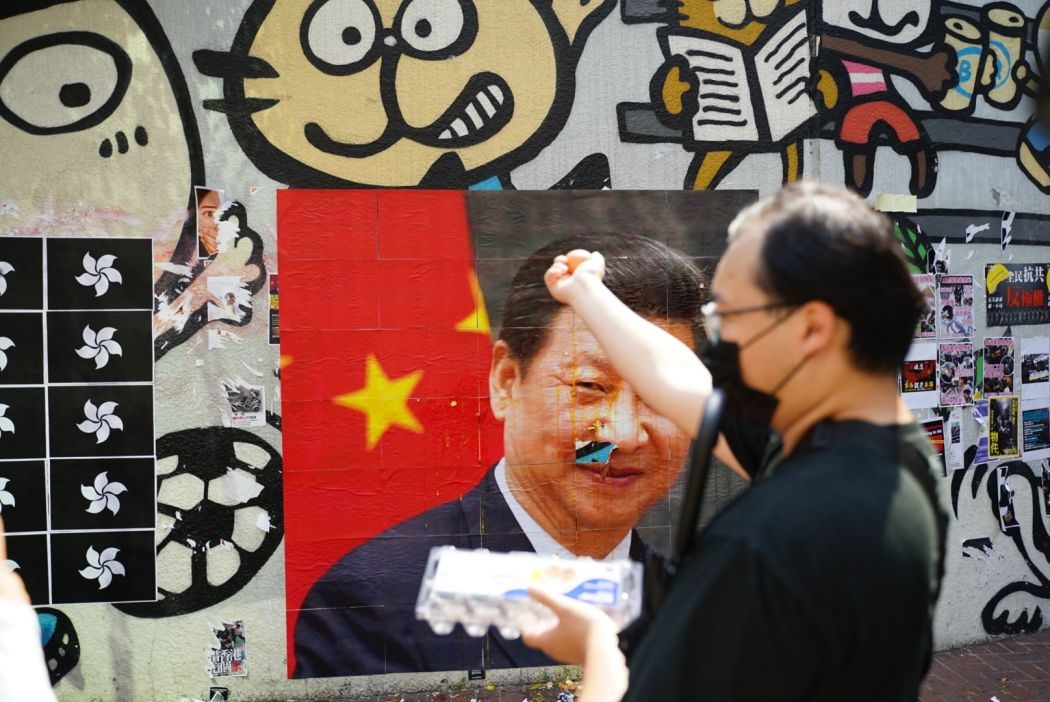China’s single-party legislature, the National People’s Congress (NPC), has announced it will modify Hong Kong’s Basic Law, which can be seen as the city’s constitution.
The draft legislation came at a time where protests were set to resume, and the Hong Kong Legislative Council was in the process of forcing similar legislation to a vote. Beijing claims that this modification is necessary for national security reasons.

Critics, on the other hand, believe it is just a further step to assert the Chinese Communist Party’s (CCP) domination over Hong Kong affairs, since the plans would rewrite the framework of the city’s autonomy in unprecedented ways; the suggested “secession” ban and “subversion of state power” would effectively end Hong Kong’s freedom of speech, assembly, and the press.
This is a grim outlook for Hong Kongers, who are already fighting to stop the deterioration of their rights under the current HKSAR government.
In terms of foreign policy, the US response to the CCP’s latest plans will play a major role in how much the proposed legislation will hurt Beijing’s interests. If, for instance, Hong Kong’s special trade status with the United States was revoked, it would result in a major blow to Chinese financial interests, as Hong Kong remains a pivot point for a large part of China’s overall foreign trade and investment. In that scenario, a large-scale outflow of capital is highly likely.
It is likely that the CCP has calculated that relations with the United States are on the path to more hostility and decoupling regardless of Hong Kong’s struggle for freedom, and that an US response is inevitable anyway.
While it is unclear what the exact response will be, it seems like it will worsen the already bad Sino-American relationship.
Potential US response
The recent passing of the Hong Kong Human Rights and Democracy Act and its signing by US President Donald Trump sent a message to Beijing that the United States would respond if Hong Kong’s autonomy was eroded. The “national security” legislation offered the US the perfect justification to assert that Hong Kong is not sufficiently autonomous to merit its special economic status.
The special status treatment has a significant meaning for both countries since Hong Kong has acted like a bridge for Chinese companies to attract foreign investment and for US investors to access the Chinese market with a foreign exchange rate and tax protections.
As China burns this bridge, it is probable that the US will now take tough action. Due to its high demand for foreign investment, this outcome would likely be worse for China than the United States.
The economic status quo of China
The National Bureau of Statistics of China has a track record of tailoring GDP and inflation data to provide an image of a strong, healthy economy.

With its excessive debts and highly limited financial transparency, China relies on foreign investment to validate high corporate valuations and achieve a return on investment for Chinese investors.
Recently, for example, Luckin Coffee and GSX Techedu have profited off of US-listed initial public offerings to achieve high valuations despite alleged fraudulent business practices.
In light of corporate espionage, “unfair” trade practices, and poor transparency from Chinese companies, the United States has grounds to impose regulations on US-listed Chinese corporations and review Hong Kong’s special status. Increased regulations and a potential review of Hong Kong’s special status would greatly harm Chinese business interests that use Hong Kong to tap the US market for capital.
Why would China shoot itself in the foot?
There are two reasons why Beijing would want to risk these economic repressions.
First, it likely foresees relations with the US will further deteriorate in the foreseeable future. Neither President Trump nor candidate Joe Biden are particularly China-friendly.
Although Trump has praised Chinese leader Xi Jinping before, he lambasts China on trade, its virus response, and alleges manipulation of international institutions. Biden has yet to take a firm stance on US-Chinese relations but has taken to Twitter multiple times to directly congratulate Taiwanese President Tsai Ing-wen.

Beijing has likely calculated that asserting control over Hong Kong is worth straining its relationship with the US because its relationship was going to deteriorate anyway.
Second, there are thousands who have been arrested in relation to past protests. Many currently await trials with little to no criminal grounds to charge them with current Hong Kong legislation.
Recently, 15 pro-democracy figures – including media executives, lawyers, ex-legislators, and activists – were arrested on grounds of “organising and participating in unlawful assemblies.” The only shared offence among these figures is vocal support for Hong Kong autonomy and democracy.
Passing a law against “sedition” and “subversion of state power” would likely enable courts to prosecute activists and citizens awaiting trial and future activists and dissidents.

Beijing is willing to sacrifice Hong Kong’s image and status as a global financial hub to extend its ability to crack down on current and future dissent.
It is no exaggeration when Hong Kong activists state that if this legislation were to pass, it would be “the death of Hong Kong.” Hong Kong stands to lose its economic advantage, global status, and individual freedoms.
What next?
The severity of the US response to the likely passing of the “national security” legislation depends on two factors. First, corporate pushback from US lobbying groups could push the Trump administration and Congress to not amend Hong Kong’s special trading status. This is possible, but it is unlikely the corporate lobby will have enough power to convince an administration that has ramped up its criticism of China and a Congress that passed the Hong Kong Human Rights and Democracy Act nearly unanimously.
Second, the immediate response in Hong Kong by its citizens will dictate the moral grounds for a US response. To act, the US needs to be reminded that it is not interfering, as Beijing would assert, but siding with Hong Kong’s people in their fight for autonomy, democracy, and individual freedoms.

